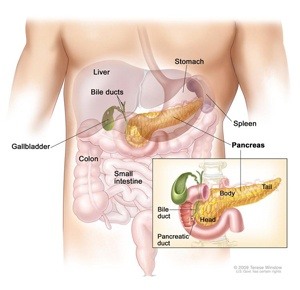Pancreatic Cancer Surgery
What Is Pancreatic Cancer?

Pancreatic cancer is when a tumor is formed in your pancreas. It is the result of the growth of abnormal cells that grow out of control.
Most pancreatic cancers are formed in the cells that produce digestive enzymes.
What Are The Types Of Pancreatic Cancer?
Cancers of the pancreas are commonly identified by the site of involvement within the pancreas. There are two types of cells in the pancreas,
- exocrine cells and
- endocrine cells.
These different cells also have different functions.
Exocrine Cells
- More than 95% of pancreatic cancers are classified as exocrine tumors.
- These tumors start in the exocrine cells that make pancreatic enzymes that help in digestion.
- Within this category, the vast majority of tumors are adenocarcinomas.
- There are many other subtypes of pancreatic exocrine tumors.
Endocrine Cells -
- Pancreatic neuroendocrine tumors (PNET) are either functional (produce hormones) or nonfunctional (produce no hormones).
- The majority of PNETs are nonfunctional tumours.
- Once again there are many other subtypes of pancreatic neuroendocrine tumours.
Where Is Your Pancreas?
The pancreas is a vital gland. The organ sits in the abdominal cavity behind the stomach just below the liver.
What Does Your Pancreas Do?
Pancreas is responsible for the production of both an exocrine and an endocrine enzymes.
- Digestive (Exocrine) Function produces several enzymes that help with the digestion and absorption of nutrients from food
- The Pancreas gland also secretes hormones (insulin and glucagon) that are involved in regulating the metabolism of sugar (endocrine) and plays a vital role in maintain normal blood sugar (glucose) levels and intestinal function respectively
Effects of Pancreatic Disease
Any disease or injury to the pancreas may cause several problems.
- Digestive System Function - Involves the secretion of digestive juices (enzymes) that aid the digestion and absorption of nutrients in the small intestine.
- Endocrine System Function - Involves the production of several hormones, such as insulin, glucagon, somatostatin and pancreatic polypeptide hormone.
How Does Pancreatic Cancer Affect Your Body?
Any change to your digestive or hormonal functions can have serious impact on your body and life. Some common effects related to Pancreatic Cancer are:
- General Malaise and Lack of Energy
- Loss of appetite and Weight Loss
- Elevated blood sugars and Diabetes
What Causes Pancreatic Cancer?
Despite the high mortality rate associated with pancreatic cancer, its causes are poorly understood. What is indicated by some statistical research is that risk factors for development of pancreatic cancer include the following:
- Family history of pancreatic cancer
- Cigarette smoking.
- Obesity.
- Chronic pancreatitis.
What Are The Signs Or Symptoms Of Pancreatic Cancer?
Pancreatic cancer symptoms depend on the site of the tumour within the pancreas and the degree of tumour involvement.
In the early stages of pancreatic cancer there are not many noticeable symptoms. As the cancer grows, symptoms may include the following:
- Jaundice or yellowing of the skin and whites of the eyes
- Light-colored stools or dark urine.
- Pain in the upper or middle abdomen and back.
- Weight loss for no known reason
- Loss of appetite.
- Fatigue.
You are at an increased risk of developing pancreatic cancer if you are
- a smoker,
- overweight,
- have diabetes
- chronic pancreatitis
- have a family history of pancreatic cancer.
What Are The Stages Of Pancreatic Cancer?
Pancreatic cancer is difficult to detect and diagnose for the following reasons:
- There are no noticeable signs or symptoms in the early stages of pancreatic cancer.
- The signs of pancreatic cancer, when present, are like the signs of many other illnesses.
- The pancreas is obscured by other organs in the abdomen and is difficult to visualize clearly on imaging tests.
- To appropriately treat pancreatic cancer, it is crucial to evaluate whether the cancer can be resected.
How is Pancreatic Cancer Diagnosed?
Pancreatic cancer can be diagnosed by reviewing your medical history and performing a thorough physical examination.
Pancreatic Tumour Markers
Your doctor may order blood tests,no tumor-specific markers exist for pancreatic cancer. Markers such as serum cancer antigen (CA) 19.9 have low specificity. Most patients with pancreatic cancer will have an elevated CA 19.9 at diagnosis.
Over time an increase of CA 19.9 levels may identify patients with progressive tumour growth. The presence of a normal CA 19.9, however, does not preclude recurrence.
Pancreatic Cancer Imaging Tests
Imaging tests that may be used to confirm diagnosis and treatment include:
- MRI - Magnetic resonance imaging scan
- CT scan - Computed tomography
- Ultrasound
- Endoscopic ultrasound
- Endoscopic retrograde cholangiopancreatography (ERCP)
- Position emission tomography (PET)
Minimally invasive techniques, such as laparoscopy and laparoscopic ultrasound may be used to diagnose and stage pancreatic cancer .
Your doctor may also perform a biopsy to confirm the diagnosis.
















